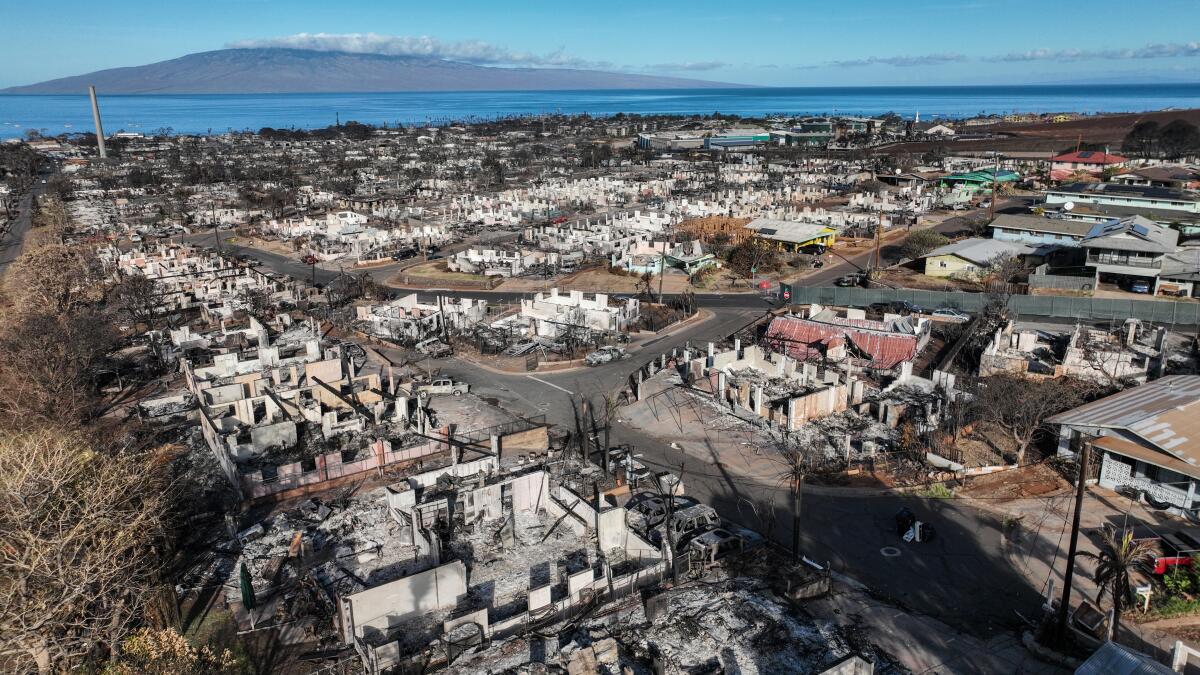FEMA dispatches teams to aid California storm recovery as Biden visits Maui to inspect fire damage

- Share via
WASHINGTON — President Biden landed in Hawaii on Monday with Federal Emergency Management Agency Administrator Deanne Criswell to inspect wildfire damage in Maui while also keeping tabs on havoc unleashed by Tropical Storm Hilary in Southern California and another set of fires that destroyed 200 homes in Washington state.
The events underscored the compounding threat of the nation’s climate disasters in the West.
“The country grieves with you, stands with you and will do everything possible to help you recover,” Biden said, adding that the government would “respect culture and traditions when the rebuilding takes place.”
Standing next to a burned banyan tree that he said was a symbol of the Hawaiian people’s resilience, Biden promised to rebuild as the people of Maui want, and “not the way others want to build.”
The president named Bob Fenton, a veteran FEMA official, to serve as a long-term recovery leader for Maui, where more than 110 people died and hundreds more are unaccounted for.
Biden surveyed damage and planned to meet with children and other victims who lost family members during the fires.
“We’re going to be there for the long term to make sure that — not just today and tomorrow but into the future — there is a coordinated strategic federal response,” Olivia Dalton, deputy White House press secretary, told reporters aboard Air Force One before landing, “because this is going to be a long, hard process.”
The federal government has more than 1,000 people in Maui, including 450 working on search and rescue. The administration has also committed to spend at least $8.6 million to help individual families with rent and other needs.
Criswell told reporters that she had also been in touch with disaster officials in California after a call Biden had on Sunday with Gov. Gavin Newsom.
Biden, who had been vacationing in Lake Tahoe, directed the Coast Guard to station aircraft in the region before the storm in case they were needed for search and rescue. Teams of federal disaster workers were also dispatched to the state as well as to Nevada and Arizona.
“Fortunately, Californians listened to their local officials and took the necessary preparedness actions to help protect themselves and their families,” Criswell said as she discussed early damage assessments that included mudslides and flooding.
FEMA announced earlier Monday that the agency had sent two teams to California to manage the federal response and would keep more officials on standby if needed.
The agency sent additional teams to help state and tribal leaders, and to provide communications and technical support. The agency said it had supplies in place before the storm at March Air Reserve Base in Riverside.
Criswell told reporters on Air Force One that FEMA was using a “layered approach” to make sure resources are available in all the disaster areas — tapping regionally based employees and getting help from other federal agencies as needed.
But she also said the agency was running out of money, putting some recovery projects on hold as the federal fiscal year ends and the Biden administration asks Congress for $12 billion more for the agency as part of a larger spending package.
“As we continue to see the impacts of what these disasters are bringing, we’re going to have to closely analyze how much is going to be needed to continue to support the increase in the number of these severe weather events with these truly complex recoveries,” Criswell said.
More to Read
Get the L.A. Times Politics newsletter
Deeply reported insights into legislation, politics and policy from Sacramento, Washington and beyond. In your inbox twice per week.
You may occasionally receive promotional content from the Los Angeles Times.











